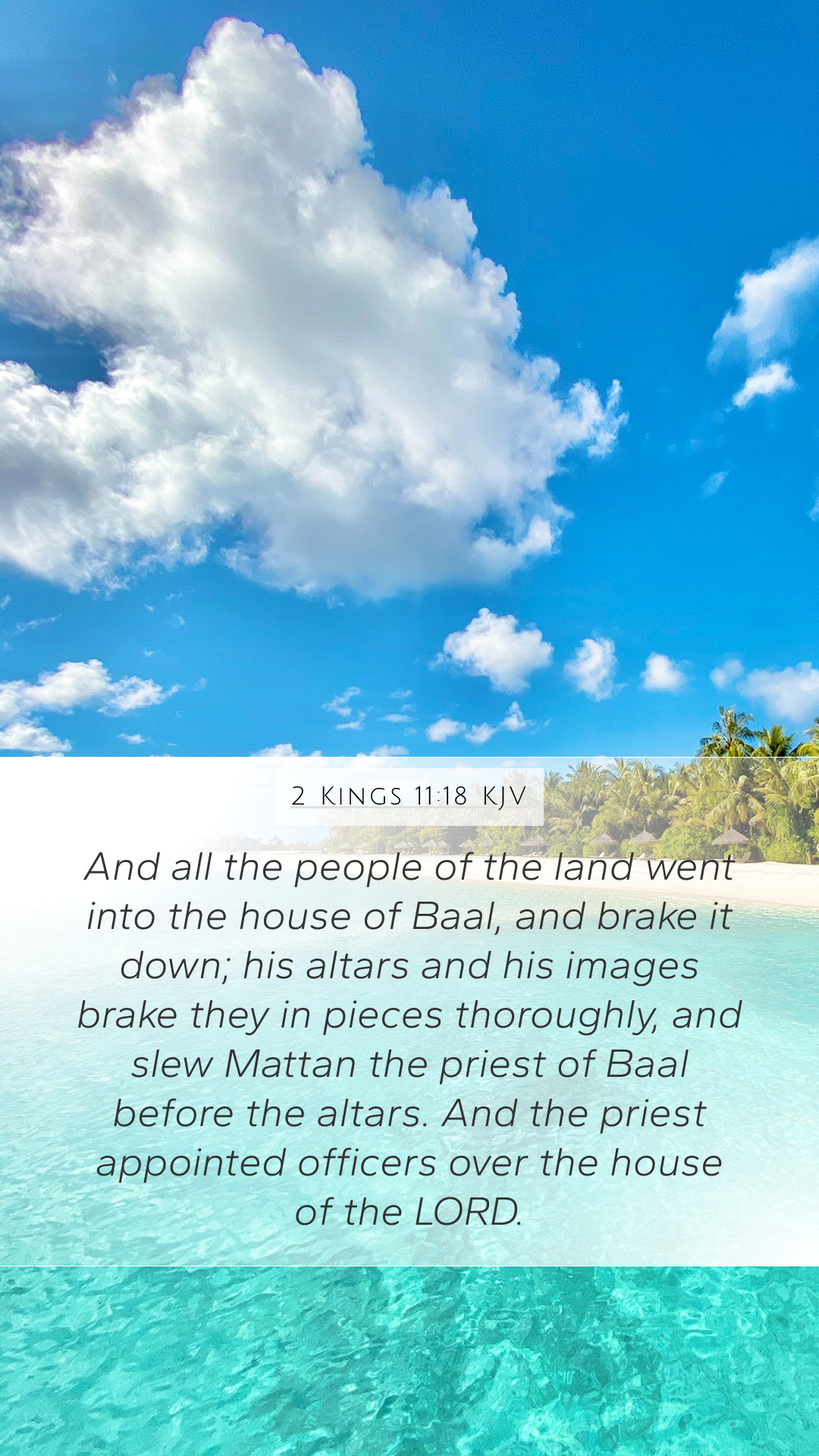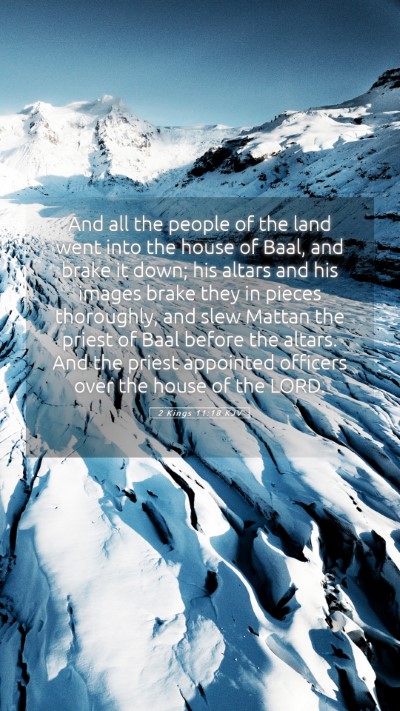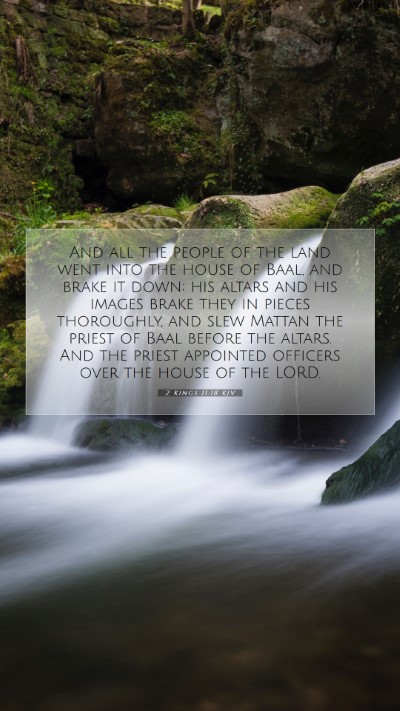Old Testament
Genesis Exodus Leviticus Numbers Deuteronomy Joshua Judges Ruth 1 Samuel 2 Samuel 1 Kings 2 Kings 1 Chronicles 2 Chronicles Ezra Nehemiah Esther Job Psalms Proverbs Ecclesiastes Song of Solomon Isaiah Jeremiah Lamentations Ezekiel Daniel Hosea Joel Amos Obadiah Jonah Micah Nahum Habakkuk Zephaniah Haggai Zechariah Malachi2 Kings 11:18 Meaning
What is the meaning of 2 Kings 11:18?
And all the people of the land went into the house of Baal, and brake it down; his altars and his images brake they in pieces thoroughly, and slew Mattan the priest of Baal before the altars. And the priest appointed officers over the house of the LORD.
2 Kings 11:18 Bible Verse Meaning
Bible Verse Meaning of 2 Kings 11:18
Understanding the Context
2 Kings 11:18 is a pivotal verse situated in a narrative about the restoration of rightful worship in Judah after a period of idolatry. This passage marks the moment when Ahaziah's mother, Athaliah, is overthrown, and the true worship of God is reinstated after her tyrannical rule. A deeper understanding of this verse can be gleaned through the insights of Matthew Henry, Albert Barnes, and Adam Clarke.
Verse Breakdown and Commentary
The verse states: "And all the people of the land went to the house of Baal, and brake it down; and his altars and his images brake they in pieces thoroughly, and slew Mattan the priest of Baal before the altars." This act signifies a collective repudiation of Baal worship, indicating a return to Yahweh, the true God.
- Matthew Henry's Commentary:
- Collective Action: Henry emphasizes the unity of the people in denouncing idolatry, illustrating the strength of communal faith. The act of breaking down the house of Baal symbolizes the decisive rejection of false gods.
- Restoration of True Worship: He notes that this event marks a turning point toward restoring proper worship in Judah, aligning with God’s covenant and the need for holiness in worship.
- Albert Barnes' Notes:
- The Role of Athaliah: Barnes highlights the influence of Athaliah over the nation, stating that her influence had led to the practice of idolatry, and this moment of destruction represents liberation from her tyranny.
- Judgment on False Priests: He also points out that the death of Mattan, the priest of Baal, signifies divine judgment upon false worship leaders, showcasing God's authority over those who lead others astray.
- Adam Clarke's Commentary:
- Historical Setting: Clarke provides historical context, explaining that this event took place during a time of moral and spiritual decline for Israel. He notes the necessity of such drastic measures to purify worship.
- Symbolism of Actions: He elaborates on the symbolic significance of breaking down idols and altars, indicating a complete overhaul of the existing spiritual landscape.
Theological Implications
The actions described in this passage hold profound theological implications for understanding how God's people respond to oppression and false worship. The communal act of destroying the house of Baal emphasizes the idea that true worship involves the entire community, coming together to affirm their commitment to God.
Bible Study Insights
Incorporating insights from various Bible commentaries can aid those involved in bible study groups or online Bible study resources. Here are some key insights applicable to study settings:
- Understanding Idolatry: An examination of what idolatry looks like today is essential. Just as the Israelites had physical idols, modern 'idols' may include materialism, status, or personal ambition.
- The Importance of Community: This passage illustrates the strength found in communal faith and accountability, making it significant for discussions in bible study lessons.
- Application to Daily Life: Participants can draw parallels from this verse to confront and dismantle modern-day 'idols' in their lives, enhancing engagement in bible study topics.
Application of 2 Kings 11:18
Applying the lessons from 2 Kings 11:18 involves a few considerations for believers today:
- Personal Reflection: Reflecting on what 'idols' one might need to break down in their lives is vital to spiritual growth.
- Courage in Faith: It takes courage to stand against societal norms that oppose true worship, similar to the courage displayed by the people of Judah.
- Group Engagement: Engaging with fellow believers for accountability and support in worship practices can nurture a vibrant faith community.
Cross References
This verse connects to several other passages that reinforce its message:
- 1 Kings 18:40: The confrontation with the prophets of Baal and the demonstration of God’s power.
- 2 Kings 10:28: Jehu's destruction of Baal worship illustrates the active removal of idolatry.
- Exodus 20:3-5: The commandment prohibiting idolatry anchors the moral framework for understanding this verse.
Conclusion
The narrative of 2 Kings 11:18 and the surrounding events illustrate the fervent hope for a return to true worship in Israel amidst chaos. By drawing on scripture analysis and biblical exegesis from public domain commentaries, individuals can grasp the rich meanings behind this biblical passage, enhancing their Bible study insights and applying relevant teachings to modern-day faith and worship practices.


